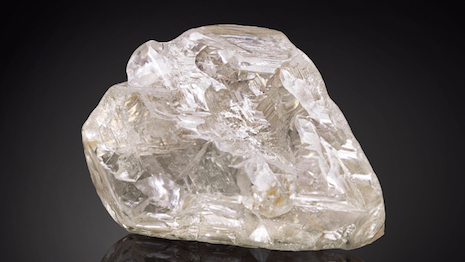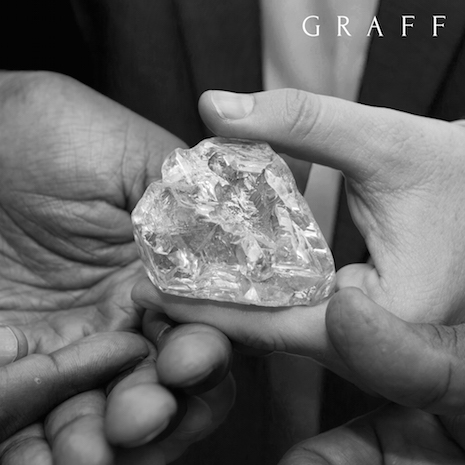 The Peace Diamond is 709 carat and sold for more than $6 million. Image credit: Graff Diamonds
The Peace Diamond is 709 carat and sold for more than $6 million. Image credit: Graff Diamonds
Earlier this month, Graff Diamonds' chairman purchased the "Peace Diamond," one of the largest rough diamonds ever found in Sierra Leone.
In doing so, Sierra Leone's government and Graff Diamonds' Laurence Graff have worked out a deal in which 100 percent of the proceeds from the sale will go toward improving the infrastructure and community resources in the African country, particularly in the area where the Peace Diamond was found. The move represents a major step for the diamond industry and the government of Sierra Leone toward eliminating conflict diamonds and making sure the people of the country that source the precious stones are justly rewarded and not exploited.
"It is an honor to have acquired this magnificent rough diamond - and that its sale will directly benefit a country in desperate need," said Mr. Graff, chairman of Graff Diamonds, London. "It is always special to be able to give back to the places that provide us with these beautiful stones."
Diamond sourcing
Sierra Leone is historically one of the biggest exporters of diamonds in the world.
Unfortunately, this fact, along with centuries of colonization, has led the country to be disproportionately poor compared to the amount of wealth that leaves it each year. Wars have been fought over the country’s diamonds and oftentimes it is the poor miners who suffer the consequences.
The Peace Diamond marks the start of a new initiative on the part of the Sierra Leone government to ensure that the money generated from the sale of diamonds is reinvested into poor mining communities.
"The sale of the Peace Diamond is a hugely important step for the diamond and luxury industry and in particular for Sierra Leone, as a country, because diamonds fueled a decade-long civil war in Sierra Leone, ending in 2002, in which rebels forced civilians to mine the stones and then bought weapons with the proceeds, leading to the term blood diamonds," said Tobias Kormind, managing director at 77 Diamonds, London.
"The fact that one hundred percent of the value of the auction sale of the Peace Diamond is going to the government and the people of Sierra Leone is unprecedented," he said.
The Peace Diamond. Image credit: Graff Diamonds
This is important because so often, diamonds are sourced by poor workers who receive little benefit from the fruits of their labor.
Selling at $6.5 million, approximately $4 million of that will go directly to the community where the diamond was found.
The rest will be given to the Sierra Leone government and the pastor who sponsored the dig to find the diamond, who will use the money for other needs around the country.
“Many companies in the diamond and gem industries already have a high level of commitment to ethical practices and to giving back to the communities where they source diamonds," 77Diamonds' Mr. Kormind said. "Great examples of such companies are De Beers, colored gemstone miners Gemfields and India-based diamond manufacturers Venus Jewels."
Giving back
As consumers search for brands offering transparent business practices, those pioneering alternative manufacturing processes that lessen environmental and social impact may cause disruption to specific sectors such as fine diamond jewelry.
Diamond sourcing, in particular, is often called into question due to concerns of environmentally harmful mining practices paired with alleged social injustices of those working in the mines.
As consumers become increasingly aware of these issues, many have opted to steer clear of diamonds, especially the millennial demographic, as they do not wish to purchase or support anything that may weigh on their conscience (see story).
Lab-grown diamonds. Image credit: Diamond Foundry
By reinvesting the money made from the sale of the Peace Diamond back into the community that found it, Sierra Leone is taking a major step toward reinvigorating its economy and giving back to the people who are in desperate need of the money that their diamonds fetch.
"This sale is a hugely important move by Sierra Leone which is designed to encourage individual, poor, artisanal miners to bring diamonds they discover to the government instead of being tempted to smuggle them," 77Diamonds' Mr. Kormind said.
"The split of proceeds is 50 percent to the Sierra Leone Government taxes, 15 percent to the Diamond Area Community Development Fund and 26 percent to the diggers who found the diamond," he said.
"I hope we see much more of this integrity and vision in the global diamond industry and similar sized rough diamonds."


